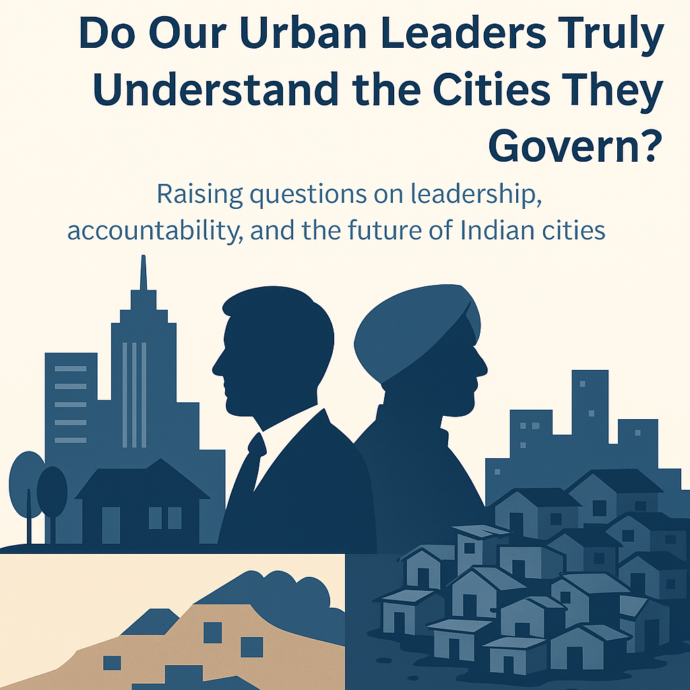do our urban leaders truly understand the cities they govern?

Why are Indian cities still gasping for air—quite literally and figuratively? The cracks in city governance are no longer subtle, from missing footpaths to overflowing drains, from shrinking open spaces to worsening urban floods. At the heart of this crisis lies a critical question:
Do our decision-makers or urban leaders truly understand how our cities work—or more importantly, how they fail?
Are Our Urban Leaders Missing the Urban Pulse?
City life is messy, diverse, and dynamic. Yet, policy responses often seem mechanical or misaligned. City leaders and administrators rarely walk the streets they govern—if they did, would they still think a broken footpath or a missing zebra crossing is a minor issue?
Most city governance still lacks inclusive thinking. Rarely are urban policies made by walking a mile in the shoes of a differently-abled citizen, a senior commuter, or a street vendor. The result? Cities that work well for the powerful few, but poorly for everyone else.
Vision, Interrupted: Governance Without Continuity
Cities need consistency in leadership and policies, not frequent resets. One of the most frustrating realities of Indian urban governance is the tendency of new officials to disregard the initiatives of their predecessors. Why is it so hard to continue a good project started by someone else? Why must each leader begin from scratch—often with the same mistakes?

This breaks public trust, delays development, and leads to a culture of inefficiency. Our cities don’t need heroes; they need stewards.
The Slum Paradox and the Illusion of Progres
Despite 75 years of nation-building, India continues to struggle with slums—places where millions live without basic rights to water, sanitation, or safety.
According to the Census 2011, over 6.4 crore people live in slums. The World Bank’s 2020 estimate is far more grim—nearly 18.5 crore, or 49% of the urban population.
We’ve had the data. We’ve known the causes. Yet, the problem persists. Why? Because addressing slums isn’t about building housing alone—it’s about tackling inequality, failed urban planning, and political neglect.
Ignoring the Experts, Misusing the Advisors by Urban Leaders
When did “subject matter experts” become checkbox hires?
Bureaucrats and elected leaders often bring in professionals, consultants, and researchers—but only to suit political goals. When experts offer tough advice, it’s ignored. Sometimes, they’re even asked to revise their recommendations to fit a predetermined agenda.
This weakens the integrity of urban policymaking and makes innovation impossible. Real urban progress requires humility. Decision-makers must be willing to listen—and even be challenged.
Why Haven’t We Built New Cities?
India’s urban population has more than doubled since 1990, from 222 million to over 508 million in 2022. Yet, we haven’t matched that growth with new cities. Instead, we keep overloading our metros until they break. Yes, optimizing existing infrastructure is important but only up to a point. Beyond that, we’re simply overpopulating outdated systems.
Why hasn’t there been a bold plan for new urban centres? Are our leaders afraid to move beyond the politics of legacy cities?
What If We Stopped Worshipping Cities?
Urbanization is often seen as the only way forward. But what if rural areas were just as aspirational? Imagine villages with great schools, healthcare, broadband access, and clean public spaces. Imagine if young people didn’t have to leave their homes just to find decent work.
Balanced regional development isn’t a romantic idea, it’s smart planning. Reducing forced migration will not only ease city stress but also bring dignity back to rural life.
Do Our Urban Leaders Even Have the Training?
City governance today demands knowledge of climate science, mobility planning, waste management, energy efficiency, data systems, and more. The political party at the helm needs to realize city management is just not about shuffling the bureaucracy but also identifying & nurturing them to be the next urban leaders.
So here’s the big question:
Are our elected leaders and bureaucrats trained for this? Most of them aren’t. And that’s a problem. Leadership is more than winning elections. In the context of cities, it should mean making informed, future-ready decisions that impact millions of lives every day.
The Way Forward: No More Excuses
India’s cities are at a turning point. We can continue with ad hoc, patchwork governance or rebuild our leadership mindset from the ground up.
Here’s what must change:
- Mandatory urban planning and governance training for all elected representatives and bureaucrats
- Structured long-term city visions that cannot be dismantled at every leadership change
- Genuine collaboration with subject experts for context-specific, data-driven planning
- Balanced investment between urban expansion and rural strengthening
Because without a shift in mindset, leadership, and governance, we’ll keep going in circles — fixing potholes, cleaning drains, and running from one monsoon disaster to the next.
India’s urban future deserves better.
And the time to act? Was yesterday. But today will do.
This is 5th article as part of a series exploring the paradoxes of Indian urban planning and seeking possible solutions. Read 1st article here, 2nd here, 3rd and 4th.
